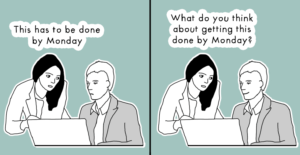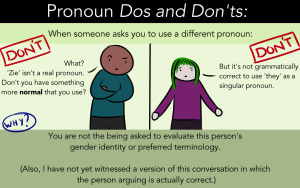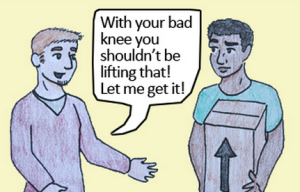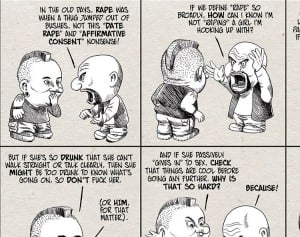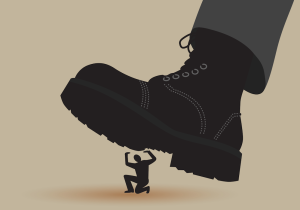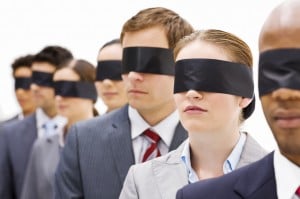
Source: Sharon D Meadows
Originally published on Role/Reboot and cross-posted here with their permission.
Sexist behavior, such as the man who parked his car and refused to pay me when I was a running a car lot because “women can’t work in parking lots,” is usually easy to spot. But, in general, sexism, so densely woven into our habits, language, and traditions, is a subtle and slippery thing.
Research shows that most people don’t see sexism even when it’s right in front of their noses.
How do you think about and respond to these 10 everyday sexisms?
1. We tolerate the ritualized silencing of women mandated by all major religions.
With minor exceptions, this bars girls and women from authority and mandates that access to the divine is mediated by exclusively male speech. This is by any definition gender-based suppression of speech that is legally unchallenged.
From the moment a girl realizes that she is not invited to participate in clerical rituals, because she is a girl, she learns that her voice is powerless and not respected. At least we pay to undermine the public good through tax credits and subsidies.
2. We live with an infinite number of hierarchy-building double standards based solely on gender.
Most of these restrict women’s free expression and ability to achieve lifetime security in equal measure.
These double standards range from expecting girls to exhibit more self-control and politeness and he’s a stud/she’s a slut sexual norms, to grossly different treatment of men and women when they age and the conflating female nudity with obscenity, to warped ideas about boys and girls “natural” capabilities.
Did you know that math ability and confidence is not so much a function of sex but status? The more equitable a culture, the more equal the math skills between boys and girls.
3. We don’t recognize benevolent sexism, the stereotypes that inform them, and their harms.
Benevolent sexism, a defining aspect of how masculinity is constructed in conservative cultures, is defined as “the negative consequences of attitudes that idealize women as pure, moral, pedestal-worthy objects of men’s adoration, protection, and provision.”
A lot of this starts in childhood and comes under the mantle of teaching girls and boys to be “ladies” and “gentleman” instead of just civil and kind human beings who care for one another equally. In other words, what many people think of as chivalry, gentlemanly, and “real man” behavior.
There is a well-documented correlation between benevolent sexism and women’s acceptance of biased gender roles.
Take the ways in which denial of the wage gap is expressed. For example, Phyllis Schlafly recently announced that closing the pay gap (she admitted it was real) would result in women being unable to find husbands. Ideas like this are deeply related to systemic support for an ideal worker who is male and a single breadwinner. That idea is a recurring theme of conservative policies about work and gender.
Our not seeing sexism where it is evident enables people with power to speculate out loud that “money is more important for men” and not lose their jobs for incompetence.
I want you to imagine a person today saying money is more important for Jewish people. Or black people. Or tall people.
The pay gap amounts to $431,000 over a lifetime. Men make less than women in only seven of 534 job types, so, of course, Tennessee Republican Lamar Alexander recently demanded to know what gender gap legislation would do to help them.
Benevolent sexists are definitively hostile to women’s workplace success. If we don’t challenge this very quiet form of sexism then we make sure it pays, but only a very small portion of the population.
4. Every day women absorb, and are expected to pay, the costs of the safety gap.
This gap costs us time and money and limits our movement.
It can limit our employment opportunities, because some jobs can become very dangerous in an instant if you are a woman. Just ask reporters, truck drivers, migrant workers, activists.
It curtails our speech and public engagement.
Ask yourselves, men, do you feel safe on your neighborhood streets? Do you choose where and when you shop or commute carefully? Do you have parking strategies, like not parking near vans? Do you use your keys as a weapon or take other similar measures? Do you avoid paying for a gym because you can exercise outside with no problems?
We teach our children that these things are “normal” and to be expected.
5. We enjoy “family friendly” media that marginalizes and objectifies girls and women, creates damaging ideals of masculinity for boys, and creates mythologies and narratives that support a male-dominated, violent, status quo.
Not only do we live with this media but most people, genuinely otherwise concerned with their children’s well-being and future livelihoods, don’t challenge entertainment companies or related media to do better.
If you are the parent of a girl, how many times have you heard a friend or relative say, “Oh, god, we can’t go see that movie, my son would NEVER go. It’s for girls!” and not said a word in response?
6. Not only do sing along to sexist lyrics and enjoy sexist products everyday, but we pay more for them just because we are women and considered not “standard.”
Can you imagine going into a pharmacy and refusing to pay more, which we do, for the “ladies” deodorant? Or going to a dry cleaner and fighting over whether or not you can call your “blouse” a “shirt” in order to pay a third less?
A Jezebel article put it like this a few years ago: “Being born a woman is a major financial mistake.”
7. Our language is profoundly biased, related to our social structure, and affects the way we think.
We pervasively use male generics and that has negative effects. I do it all the time—I can’t seem to break the “guys” habit. We still use male words, usually to denote positive categories, like “mankind” but female terms for negative ones, “hos,” and “sluts.” We don’t, for example, sit kids down and talk to them about the social harms of “bitch.”
Women are routinely referred to as “girls” (childlike and dependent) and men “men.” We’re more likely to be referred to as animals, and with a purpose.
This may sound trivial until you consider that Japan has gendered terms for all three pronouns, whereas the Nordic countries are trying to introduce gender-neutral ones. Why does this matter? Well, Japan is the least gender equitable place when it comes to men and women’s labor and the Nordic countries the most.
I’m not suggesting causality, just significant cultural correlations that we are not immune to.
8. We tolerate prejudice against men that inhibits equality. We think it’s all very funny.
I’ve seen women take babies away from their fathers in parks in order to change their diapers because “men aren’t good” at that sort of thing. Or maybe you’ve listened to men call themselves their children’s “babysitters,” or sat through television ads that portray men as incompetent idiots, slobs, sexist dolts, or children when it comes to taking care of domestic life.
More dangerous, however, is the repetition of rape and abuse myths that endanger boys and men by perpetuating discriminatory ideas about who gets raped—drunk girls who ask for it or make the mistake of stumbling into dark alleys.
9. We ignore street harassment, which is the regulation of women and LGTB people in public space.
There is not a week that goes by when my daughters and I are not harassed on the street.
Most people either don’t know it’s going on, don’t believe it when they hear about it, don’t take it seriously when they do, and rarely talk to their children about it.
The effects of this harassment and what it represents as a mirror of our society cannot be underestimated.
10. We let our schools teach sexist lessons.
First, our education system erases the contributions of women in history and fails to provide role models and an accurate portrayal of the past.
Girls go into our schools with assuredness and ambition, but they don’t leave that way.
Do you know what A Vindication of the Rights of Women is? Do you know the significance of the Grimke Sisters? Were you taught the Declaration of Sentiments in school? I sincerely doubt that schools are teaching that the earliest (and still fighting) freedom fighters in the United States were indigenous women challenging colonialism. I’ll stop now.
Second, schools enforce social norms, for example, through dress codes that undermine diversity and equality.
Third, they are structurally still based on complementary models for men and women, from boards, which tend to be run by more men (because, you know, that’s where the hard job of money is done) to everyday volunteering. School administration and coaching is male dominated in an industry that is made up mostly of women.
So, we have our children in a media environment that marginalizes women’s historical efforts, sexualizes girls with outdated rules, provides gender imbalanced social structures and, for good measure, incorporates gendered classroom dynamics that hurt both boys and girls.
Why is anyone shocked by the confidence gap?
By the time boys and girls leave high school and enter college, boys are twice as likely to say they are prepared to run for office.
I know hardworking individual teachers trying their hardest to offset these effects, but as institutions and cultures, our schools are deeply sexist and not interested in real change.
***
Honestly, setting aside the real physical harms that people face, living with sexism is like having a lifelong low-grade fever.
This is a short list. If you haven’t read the Everyday Sexism Project twitter feed on a daily basis, or read founder Laura Bates’ newly published book based on it, you might want to.
When women take note of sexism during their daily lives—for example, talking openly about street harassment or workplace bias—and name it for what it is, they stop accepting it as “normal.”
For female politicians dealing with biased commentary and political opponents all too comfortable in the boys’ club of the public sphere, openly confronting sexism works.
The sad fact is that while it is polite to express sexist ideas, confronting them is considered the height of rudeness and humorlessness.
When a man at a neighborhood cocktail party comments rudely on my breasts or when another in a meeting interrupts me incessantly while trying to talk to other men, it is me, not them, who is considered hostile and unpleasant for saying, “My face is up here,” or “Would you please stop interrupting me?”
When my children’s school fails, year after year, to teach my children a gender balanced history or enforces dress codes in sexist and homophobic ways and I am compelled to point these practices out as deleterious to girls and boys, reception to these ideas can be best described as tepid.
Are you acknowledging sexism when it happens, and what do you do about it if you do?
[do_widget id=”text-101″]
Soraya L. Chemaly writes about gender, feminism and culture for several online media including Role Reboot, The Huffington Post, Fem2.0, RHReality Check, BitchFlicks, and Alternet among others. She is particularly interested in how systems of bias and oppression are transmitted to children through entertainment, media and religious cultures. She holds a History degree from Georgetown University, where she founded that schools first feminist undergraduate journal, studied post-grad at Radcliffe College.
Search our 3000+ articles!
Read our articles about:
Our online racial justice training
Used by hundreds of universities, non-profits, and businesses.
Click to learn more
Most Read Articles
- « Previous
- 1
- …
- 30
- 31
- 32











